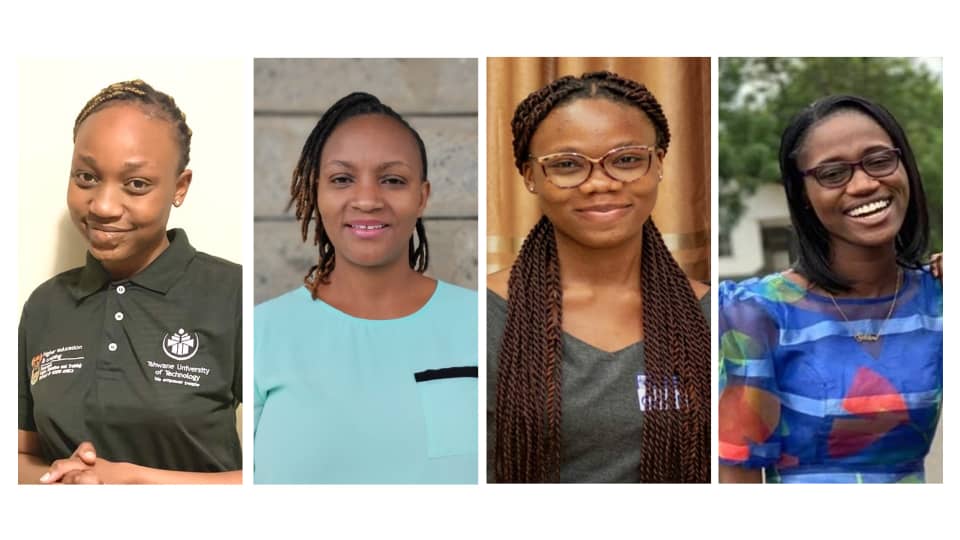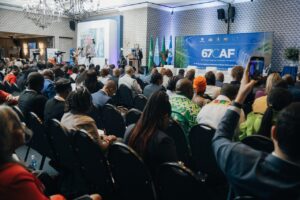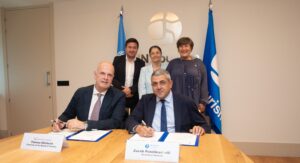The Accelerating Youth Entrepreneurship and Innovation for Sustainable Tourism in Africa project has reached its final stage of implementation. With an aim to foster pathways for developing innovative mentorship programs in tourism that support young opportunistic entrepreneurship interventions, which are climate-friendly and digitally oriented for sustainable tourism development in Sub-Saharan Africa, the project is proving to be an impactful collaboration between academia and industry, delivering on SDG 17, SDG 4, SDG 8, SDG 9 and SDG 13.
The partnership between University of Brighton, UK (Prof. Marina Novelli – Project Lead, Drs. George Tsekouras, Aline Figlioli, Adam Jones and Catherine Kelly), Strathmore University, Kenya (Dr. David Chiawo, Sarah Mungai, Festus Mburu and Dephine Otieno), University of Ghana (Dr. Kobby Mensah and Dr. Sheena L. Boateng), Sustainable Travel and Tourism Agenda, Kenya (Judy Kepher Gona and Job Odhiambo) and Africa Tourism Partners, South Africa (Daniel Adidwa, Dr. Pearl Sifolo and Kwakye Donkor) has proved that the collaboration between academia and industry can change the way we do things and the future of youths’ learning and involvement in tourism entrepreneurship.
The project was organized in 2 phases:
Phase 1 – Research/Situation Analysis (September-December 2021) aimed at delivering research into pathways for expanding youth entrepreneurship and foster sustainability in youth led tourism enterprises in SSA. Finding of this research informed Phase 2- Implementation (January-September 2022) of the project, which was divided into 4 stages:
• Inspire Youth
• Exchange Knowledge
• Exhibit Success
• Sustain the Future
Phase 1 Situation Analysis Study highlighted:
• High unemployment rates among youth in Sub Saharan Africa with tourism being an important sector for creating jobs in most African countries.
• The tourism value chains of Kenya, Ghana and South Africa are more advantageous for creating employment for low skilled than the high skilled youth.
• This constituted a disadvantage for the tourism graduates who are regarded as a highly skilled workforce, generally resulting in tourism graduates being forced to seek employment in jobs that are below their skill set or fail to gain employment all together.
• Most tourism students at universities are unlikely to start a business after they graduate, but if barriers were addressed, they may.
• The university curriculum fails to provide learners with an entrepreneurial mindset, primarily promotes salaried employment, is more theoretical than practical and fails to engage key sector stakeholders in its development review and delivery.
• Generally young entrepreneurs and potentially young entrepreneurs in tourism have limited access to affordable credit, limited financial knowledge and competency and are challenged by market access opportunities for their products.
• While tourism students have high potential of adopting and adapting digital innovation, their enterprising and engagement in digital solutions is hindered by high costs of accessing digital infrastructure.
• Fear of failure and limited availability of tourism mentorship programs are challenges preventing learners from choosing entrepreneurship career paths.
• Social enterprises in tourism may provide adequate employability opportunities for graduates, as social enterprises require an advanced level of knowledge and skills and are created from the understanding of problems youth face in their locality,
• These would provide them with opportunities to create inclusive and decent work opportunities for themselves, while addressing poverty issues and environmental problems.
• The study concluded that tourism graduates are likely to start and grow an innovative (social) enterprise, if they were provided with access to mentorship programs that bridged curriculum gaps and provided them with the additional support needed to overcome barriers.
Phase 1 concluded that tourism graduates are likely to start and grow an innovative (social) enterprise, if they were provided access to mentorship programs that bridge curriculum gaps and provided them with the additional support needed to overcome barriers.
Phase 2 was aimed at:
• Promoting (social) entrepreneurship and innovative thinking among tourism students
• Leveraging on digital platforms where tourism students can access tools and knowledge to develop skills and strategic partnerships that they need for innovative and sustainable (social) entrepreneurship
• Enhancing knowledge exchange and peer-to-peer learning between higher learning institutions, ecosystem entrepreneurship players and students from Kenya, Ghana, South Africa and the UK.
• Lobbying and advocate for favorable policy environment for young entrepreneurs and aspiring entrepreneurs in tourism
Phase 2 – Stage 1: Inspire Youth included:
• Leveraging on digital technology and proving access to mentorship opportunities for tourism students who aspire to start and grow a tourism business.
• Drawing on the University of Brighton/CENTRIM Inspire tried and tested approach and adapt the INSPIRE Open Innovation for SMEs online platform (https://inspire-smes.com/) we are providing staff and students with skills, knowledge, tools, technology, and strategic partnership needed to deliver on innovative and sustainable (social) entrepreneurship ventures.
• Employing an adapted version of the Inspire model (from SMEs to students’ start-ups and in the specific tourism context), we are training lectures and ecosystem players on the use of the Open Innovation approach
• By adopting a Train-of-Trainers (ToT) approach, Inspire model and platform offered a training to staff as well as mentorship and business clinics to tourism students (15 Kenya, 15 Ghana, 15 South Africa/ATP).
• The ToT format was conceived to be scalable and transferable beyond project life and in other destinations.
The INSPIRE YOUTH Africa programme:
• Foster pathways for developing innovative mentorship programs in tourism for supporting young opportunistic entrepreneurship interventions which are climate friendly and digitally oriented for sustainable tourism development in SSA.
• INSPIRE YOUTH supports the development of 45 young entrepreneurs/graduants from Ghana (University of Ghana), Kenya (University of Strathmore) and South Africa (Various Universities across South Africa).
• Leverage on digital platforms where tourism students can access tools and knowledge to develop skills and strategic partnerships that they need for innovative and sustainable (social) entrepreneurship
• Enhance knowledge exchange and peer-to-peer learning between higher learning institutions, ecosystem entrepreneurship players and students
Phase 2 – Stage 2: Exchange Knowledge
This included a programme of joint tourism entrepreneurship masterclasses, workshops and panels by the partnering institutions to enhance knowledge exchange and peer-to-peer learning between Higher Education Institutions, Ecosystem Entrepreneurship player and students from Kenya, Ghana, South Africa and UK.
Phase 2 – Stage 3: Exhibit Success
Best Students’ Entrepreneurial Propositions
• 1 winner (£1,000) and 1 runner up (£400) for each country
• Students presented their ideas on the 4th July and top performers were selected for a grant/seed funding to support the operationalization of their innovative, digitally oriented and climate friendly idea, which will be presented at the end of this presentation.
• Winners were acknowledged on the 29th July, during the Africa Youth in Tourism Summit held in Windhoek Namibia.
• A virtual Award Ceremony was held on the 2nd August 2022.
Phase 2 – Stage 4: Sustain the Future
• We intend to carry on lobbying and advocating for favorable policy environment for youth by engaging with our wider industry and policy networks.
• We will use this project to showcase what is possible if the right environment is put in place.
• We are engaging in negotiations with additional partners to ensure continuity beyond the project life
• We aspire to scale up our initiative into an Inspire Africa programme, which will be delivered in other African locations and with additional partners.
South African Winner – Student: Geniffer Mathebula, University: Tshwane University of Technology
Project: Discover Ekasi App
Description:Discover Ekasi App its core essence is selling Digital tours that take you through my township. Discover Ekasi
Kenyan Winner: Student: Susan Waweru, University: Strathmore University
Project: Zoya, Description-Zoya is about a digital platform offering diverse Cultural Heritage Tour Experiences.
Ghana-Joint Winners – Student: Sylvia Largeh Tettey and Carolyn Sekyi-Addo
University: University of Ghana
Project: Ghana Eats
Description
Ghana Eats is a new platform that aims to provide information about basic Ghanaian cuisines by including a dietician, a chef and a menu planner to help inbound and outbound tourists who are concerned with their general diet, those who seek to know more about Ghanaian local cuisine and for those who have an interest in consuming Ghanaian local dishes.








